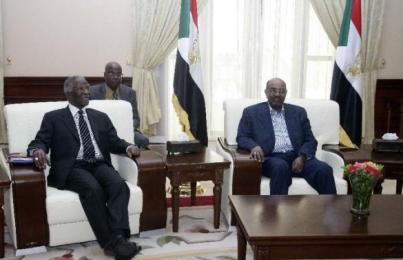Sudan’s Bashir says determined to reach negotiated solution to Two Areas conflict
August 3, 2015 (KHARTOUM) – The Sudanese president Omer Hassan al-Bashir on Monday has discussed with the African Union chief mediator, Thabo Mbeki, the recent developments of the peace process and national dialogue besides relations between the two Sudans.

“The government told the mediator that it seeks to bring the war in the Two Areas to a definitive end by achieving a comprehensive cease fire and discussing other issues through negotiations,” he added.
The presidential aide also said that Bashir briefed Mbeki on the developments of the national dialogue including its agenda and the national figures participating in it.
He disclosed that the exact date for convening the national dialogue would be set after the anticipated meeting between Bashir and the dialogue coordination body next Wednesday.
In a separate press conference, Sudan’s first vice-president, Bakri Hassan Salih, for his part said the former South African president came to Khartoum to explore possibilities of a Sudanese role in resolving the ongoing crisis in South Sudan as well as discussing the national dialogue and peace process in the Two Areas.
He pointed in a press conference on Monday that Mbeki is only a facilitator for the national dialogue and has no powers to transfer the process abroad.
Mbeki, for his part, said in press statements following his meeting with Bashir they discussed the peace process in Sudan, adding the latter expressed his government’s readiness to stop the fighting in South Kordofan and Blue Nile once and for all.
However, he pointed out that the meeting didn’t discuss a proposed date for resuming negotiations on the Two Areas.
Blue Nile and neighbouring South Kordofan state have been the scene of violent conflict between the Sudan People’s Liberation Movement/North (SPLM-N) and the Sudanese army since 2011.
The Sudanese government and rebel group failed to reach a cessation of hostilities agreement after a series of talks brokered by the African Union High Level Implementation Panel (AUHIP) in December 2014.
Last April Mbeki suspended indefinitely a pre-dialogue process aiming to bring together the ruling National Congress Party (NCP) and the political and armed opposition forces to discuss the preparation of the national dialogue which is to be held inside the country.
The suspension intervened following the refusal of the Sudanese government to take part in the preparatory meeting two weeks before the general elections. The NCP officials at the time said it would send a negative massage to the Sudanese voters.
Since, Khartoum said ready to participate in the meeting and informed the African Union that Mbeki is welcome to resume discussions with the government on the process.
RELATIONS WITH SOUTH SUDAN
Meanwhile, Mbeki said the Sudanese president underscored his absolute commitment to implement the cooperation agreements signed with South Sudan in order to the resolve outstanding issues between the two countries.
He pointed the mediation would resume meetings of the Joint Political and Security Committee (JPSC) between to discuss border demarcation and the demilitarized zone between the two countries but he didn’t set a specific date for the proposed meeting.
In September of 2012, both Sudan and South Sudan signed a series of cooperation agreements, which covered oil, citizenship rights, security issues, banking, border trade among others.
In March 2013, the two countries signed an implementation matrix for these cooperation agreements.
However, the two sides did not reach an agreement over the identification of the zero line as they failed to determine the surface of a disputed area called 14 Mile located between Northern Bahr el Ghazal and East Darfur states.
In accordance with the security arrangement the two parties have to withdraw their troops ten kilometres from the unmarked border.
